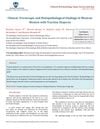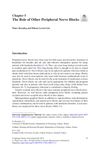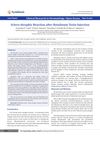 January 2020 in “Clinical dermatology open access journal”
January 2020 in “Clinical dermatology open access journal” Changing certain hairstyles can prevent worsening hair loss in Mexican women.
 January 2020 in “Elsevier eBooks”
January 2020 in “Elsevier eBooks” Plant-based chemicals may help hair growth and prevent hair loss but need more research to compete with current treatments.

PlacMA hydrogels from human placenta are versatile and useful for cell culture and tissue engineering.
 February 2019 in “bioRxiv (Cold Spring Harbor Laboratory)”
February 2019 in “bioRxiv (Cold Spring Harbor Laboratory)” The gene Prss53 affects hair shape and bone development in rabbits.
 January 2019 in “Headache”
January 2019 in “Headache” Peripheral nerve blocks are a safe and effective way to treat various headaches and provide lasting pain relief.
 January 2019 in “Advances in stem cells and their niches”
January 2019 in “Advances in stem cells and their niches” Skin health and repair depend on the signals between skin stem cells and their surrounding cells.
 October 2018 in “InTech eBooks”
October 2018 in “InTech eBooks” The gene Foxn1 is important for hair growth, and understanding it may lead to new alopecia treatments.

New treatments for hair loss show promise, including plasma, stem cells, and hair-stimulating complexes, but more research is needed to fully understand them.
 July 2018 in “Elsevier eBooks”
July 2018 in “Elsevier eBooks” Frontal Fibrosing Alopecia is a type of hair loss affecting mostly older women, with no agreed best treatment.
 July 2018 in “Elsevier eBooks”
July 2018 in “Elsevier eBooks” Telogen Effluvium is a common, usually reversible hair loss condition, often improved by removing the trigger and possibly treated with various products, though their effectiveness is uncertain.

Stem cells regenerate tissues and their behavior varies by environment, suggesting the hematopoietic system model may need revision.
 September 2017 in “Springer eBooks”
September 2017 in “Springer eBooks” Stem cells show promise for hair loss treatment, but no effective product for hair regeneration has been developed yet.
 January 2017 in “Springer eBooks”
January 2017 in “Springer eBooks” The document explains various skin conditions and their treatments.

The document explains different types of skin lesions and their characteristics, causes, and related conditions.
 September 2016 in “Journal of Dermatological Science”
September 2016 in “Journal of Dermatological Science” A gene mutation worsens skin irritation in mice due to a lack of certain fats.
 April 2016 in “Journal of Clinical Research in Dermatology”
April 2016 in “Journal of Clinical Research in Dermatology” A woman had skin and hair issues after a botulinum toxin injection.

Modern hair restoration techniques can effectively treat hair loss and provide natural-looking results.
 July 2015 in “Cambridge University Press eBooks”
July 2015 in “Cambridge University Press eBooks” Androgens like testosterone affect skin health and can lead to conditions such as acne and hair loss, with various treatments available.
 March 2015 in “Plastic and reconstructive surgery”
March 2015 in “Plastic and reconstructive surgery” Human skin has multiple layers and functions, with key roles in protection, temperature control, and appearance.
 January 2015 in “Hair therapy & transplantation”
January 2015 in “Hair therapy & transplantation” New hair and scalp disease diagnosis methods are important for correct treatment.
 September 2014 in “Springer eBooks”
September 2014 in “Springer eBooks” Men and women experience skin aging differently due to changes in sex hormone levels with age.

Keratin hydrogels from human hair show promise for tissue engineering and regenerative medicine.

Some plant-based ingredients may help with hair growth and care, but more research is needed to confirm their effectiveness.
 November 2013 in “John Wiley & Sons, Ltd eBooks”
November 2013 in “John Wiley & Sons, Ltd eBooks” Skin symptoms can indicate endocrine disorders and have various treatments.
 November 2013 in “Elsevier eBooks”
November 2013 in “Elsevier eBooks” Skin and hair renewal is maintained by both fast and slow cycling stem cells, with hair regrowth primarily driven by specific stem cells in the hair follicle bulge. These cells can also help heal wounds and potentially treat hair loss.
 May 2013 in “Springer eBooks”
May 2013 in “Springer eBooks” Skin problems in the elderly are unique and may indicate other diseases, involving changes in skin, hair, nails, and increased cancer risk.
 March 2013 in “Revista Brasileira de Cirurgia Plástica”
March 2013 in “Revista Brasileira de Cirurgia Plástica” Using platelet growth factors can improve hair density in transplants, especially for those with fine hair.
 September 2012 in “The Egyptian Journal of Histology”
September 2012 in “The Egyptian Journal of Histology” Flutamide caused damage to male rat reproductive organs and may affect fertility.
 July 2012 in “Springer eBooks”
July 2012 in “Springer eBooks” The document concludes that proper diagnosis and treatment of nonscarring alopecias can improve quality of life and hair regrowth is possible as the hair follicle remains intact.
 April 2012 in “Informa Healthcare eBooks”
April 2012 in “Informa Healthcare eBooks” Lichen planopilaris is a rare, chronic condition causing hair loss, mainly in middle-aged women, and early treatment is important to prevent permanent baldness.






























